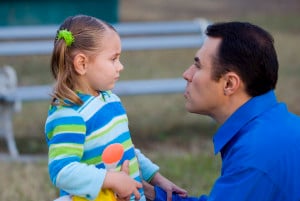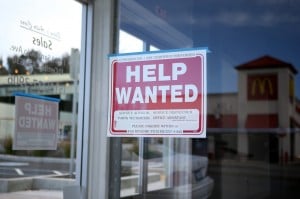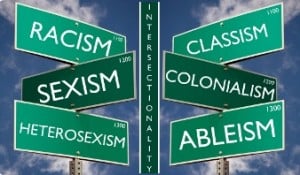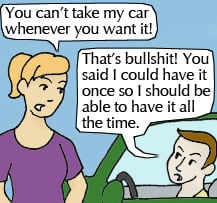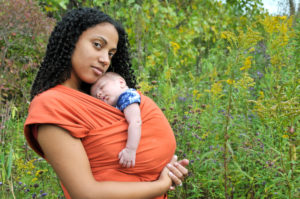
A parent and their newborn in a field of wildflowers.
When Britni de la Cretaz accepted an invitation this year to sit on a panel at BinderCon, a large, women and gender non-conforming writing conference, she was pregnant.
She knew that by the time the conference rolled around, she’d have a newborn, but the thought that her new baby-in-arms wouldn’t be welcome didn’t even occur to her.
To her surprise, BinderCon’s staunch over-18-only policy leaves no wiggle room for parents of non-separating infants – not even those who’ve recently given birth. Parents may apply for a childcare stipend, she was told, but no on-site care is offered (nor is one allowed to bring a caregiver with them – babies and children may not be on the premises, whatsoever). The panel Britni sat on was ironically named “Body Politics: Writing Reproductive Rights and Justice During the War on Women.”
Like other parents who have faced this dilemma, Britni had to decide whether to give up and just stay home, or figure out how to navigate securing childcare as a visitor, without resources or connections in an unfamiliar city. The stipend she was offered wasn’t sufficient to cover an entire weekend of care. But even if it were, her breastfed newborn was simply physically unable to be away from her for more than a couple of hours at a time – let alone an entire weekend.
Determined to attend, Britni got creative.
A few weeks before she was set to leave, she reached out to fellow attendees asking for their help with off-site childcare. Attendees signed up on a Google spreadsheet that reflected the timeslots of Britni’s most valuable sessions – her panel, of course, and a handful of others, ranked by priority. People jumped in, coordinating their schedules and sacrificing their own time in order to support a fellow writer.
As I watched this go down from the sidelines, it was equal parts encouraging to watch a traveling childcare village come together, and enraging to watch the way that feminism is still ostracizing parents in 2016. Mostly the latter for me, if I’m being honest.
Because this ugly underside of feminism – the one where parents are not trusted to make good choices, and where they’re instead silenced and excluded – is usually shrugged off or minimized or even completely dismissed as an overblown emotional reaction by a paltry few. (Of course, this gaslighting and tone-policing from fellow feminists is another notable irony.)
The outrage among fellow writers – parents and non-parents, alike – was heartening, and poured out during the conference as social media call-outs to BinderCon. The chorus challenged BinderCon organizers to reconcile their mission, which states their commitment to “advancing the careers of women and gender non-conforming writers” with a policy that explicitly further marginalizes and excludes some writers with children.
Though BinderCon’s policy is buried underneath a supposed feminist tenet of advancement, their policy stands in direct conflict with feminism itself. The subtext of policies that make it difficult for parents to attend, combined with the refusal to listen to the folks who are ignored and hurt by those policies comes off like this: “Listen, we know best – children are disruptive, parents are inconsiderate, and the attendees without small children are the baseline of normalcy, who take priority here.”
But BinderCon isn’t alone here – not by a long shot.
As a parent, I’ve often been dismayed and surprised that feminist spaces adopt similar mainstream policies that exclude or patently devalue parents. Policies like “No kids allowed – no exceptions” at conferences, lectures, work spaces, and social events exclude a number of people from being able to attend or participate.
Those barriers are most often harmful to parents with infants, who don’t want to (or physically can’t) separate yet from their babies. But they also hurt single parents and low-income parents with children of all ages when their needs aren’t considered or accommodated in any way.
As a result, parents get forced into two unpalatable corners – they either can’t attend or they must find childcare that they and their babies aren’t yet ready for (or that they can’t afford).
Parents who can’t separate from their infants (either because their babies are breast/chest feeding or because they’re too young, or because of their family norms) aren’t helped by childcare stipends or designated childcare areas. These parents need inclusive babies-in-arms policies, which would create space for them to manage and feel supported in their overlapping identities.
Unfortunately, what has been reflexively happening when feminist organizations are called out regarding how their anti-parent policies are hurting people is a confounding dance around justifications and resultant double downs on why their policies are appropriate.
And this is nothing short of an unproductive, uncritical, and oppressive way to address a named injury.
Some of the hashtags that emerged out of the BinderCon Twitter callout were #ironyfordays and #whosefeminism. And nothing could more succinctly sum up the discrepancy of the unchecked privilege inherent in justifying exclusionary policies alongside a mission to elevate the voices of the most marginalized.
Feminist organizers should be the first to recognize what oppressive systems they’re upholding when they ban small children (and in turn, their parents) from feminist spaces. Here’s why.
1. Excluding Parents Reinforces Stigma
Most childfree, exclusionary policies are based on the assumption that kids are always inherently disruptive and that parents aren’t considerate of others’ when their kids make sounds.
Sure, some parents are seemingly inconsiderate, but not most. As a parent to three kids, I can attest that no parent wants to be on the receiving end of the scowls of strangers who are disgusted at the inconvenience of the presence of you and your obnoxious kid.
But the stereotype about inconsiderate parents is one that even the most thoughtful parents interface with pretty regularly.
These ideas about “inconsiderate” or “undisciplined” or “bad” parents creates an us-versus-them mentality. I’ve listened to hardcore reproductive justice advocates talk endlessly about the injustices and stigma people face around abortion, and then go on to shame parents for their parenting choices and mistakes.
Feminism has fought damn hard – and is still, in fact, struggling – for the right to not be forced into parenthood. But somewhere in the process, it seems like feminism lost focus on the full spectrum of what reproductive justice really means. And, frankly, we should address the fact that the singular focus on abortion as reproductive freedom is a starkly white feminist problem.
Reproductive justice, a term coined by women of color, encompasses far more than the right to access birth control and abortion. In full, reproductive justice includes the right to have a child, the right not to have a child, and the right to parent the children we have.
White feminism’s selective attention to the injustices faced in abortion access over other injustices on the spectrum – like the loss of autonomy pregnant and birthing people face and the dismissal of parenting struggles – reveals that white feminists are still pretty hung-up on antiquated ideas about the value of parents. Excluding parents from being able to attend events with babies-in-arms is a testament to that engrained hierarchy.
While no feminist would dare challenge a person’s right to birth control or abortion, there seems to be a double standard for judging and shaming a parent’s sense of knowing what is best for their kids – including and especially minimizing the desires of parents to be with their babies, while also contributing to important conversations.
2. Exclusion Further Marginalizes Parents
Parents – especially women and femme presenting parents – have been held on the margins in all aspects of our lives. We consistently have it reinforced that we are either caregivers first, or that we must compromise that role in order to interact with other aspects of our identities.
While feminism has evolved over the decades, there is still distinct divisiveness between those who are parents and those who are not.
Societal value systems bleed over into feminism when the priorities and voices of those who are not parents to small children are elevated, while those who are continue to be marginalized.
Whatever marginalized identities intersect within us, those become elevated once we’re parents. Parents with small children are basically not welcome anywhere. The years I spent nursing my children (a cumulative total of just under a decade of my life, spread over all of my children), I always felt hyperaware no matter where I was when they asked to nurse in public.
Should I do it here in the library – or is that too vulgar? Will someone be offended if I lift my shirt in this restaurant booth? Do I just abandon my grocery cart here so I don’t have to interface with the side-eyes? These were all questions I interacted with as a mother of small children. It’s no wonder parents feel isolated and confined to their homes in the months – and even years! – following having a child.
Feminists enacting exclusionary policies need to wrestle with the real reason we continue to maintain ignorance and passiveness around the needs of parents – and that is that, as feminists, we’ve still bought into the idea that primary caretaking parents hold the least amount of value.
The reality is, a parent with a child in their arms will be the most excluded voice, especially the more marginalized they are.
3. It Relies on the More Privileged to Make Rules
Exclusionary childfree zones are often made by people who don’t directly understand the struggles that parents face. People who don’t have kids can’t pretend to know how to solve this problem without listening and deferring to the people who intersect with this issue, personally.
I once heard a child-free person exclaim, when talking about the issue, that because her parents were “young parents” that she therefore knew “a lot about young parenting.” To be clear, being parented doesn’t offer any firsthand knowledge about the struggles involved in parenting.
This problem isn’t just rooted in childfree folks making policies about people with kids, though. The responsibility also lies with parents of all ages failing to see outside of their own particular privilege to acknowledge and affirm the variety of needs and struggles that other parents face.
Comments like “I had to do it, and I survived – it’s your turn now” or “A childcare stipend worked great for me, I don’t know what the big deal is” are all merely excuses for dismissing and devaluing the needs of other parents that aren’t the same as their own.
Just because other childcare options work for one parent, it doesn’t negate the reality that it doesn’t work for another. Deflecting away from someone sharing their very real struggles back to one’s own personal tunnel vision screams of an intolerable privilege – something we frankly shouldn’t see in any feminist leadership claiming to be intersectional.
Feminists should be the very first in line, ready to do the deep listening to parents who are naming how this exclusion is hurting them. When those who identify as leaders in feminist organizations dig in their heels about the importance of keeping kids (and therefore parents) away from their spaces, it is irony forever.
Feminism – at its core – is about elevating the needs of the most marginalized. And the fact is that the people at the table without small children wield more privilege than those with small kids.
At every turn, parents are consistently excluded from professional, academic, activist conversations, and more. Parents have literally been begging for a seat at the table. It’s past time we made room for them.
[do_widget id=’text-101′]
Kathi Valeii’s writing focuses on parenting, feminism, and justice-related issues. She loves the woods, her garden, most things vintage, her kids and her partner (not necessarily in that order). Her work has appeared in the New York Times, SheKnows, Ravishly, The Stir, and The Establishment, and she is a contributing writer for Daily Progressive. Follow her on Twitter @kathivaleii
Search our 3000+ articles!
Read our articles about:
Our online racial justice training
Used by hundreds of universities, non-profits, and businesses.
Click to learn more








